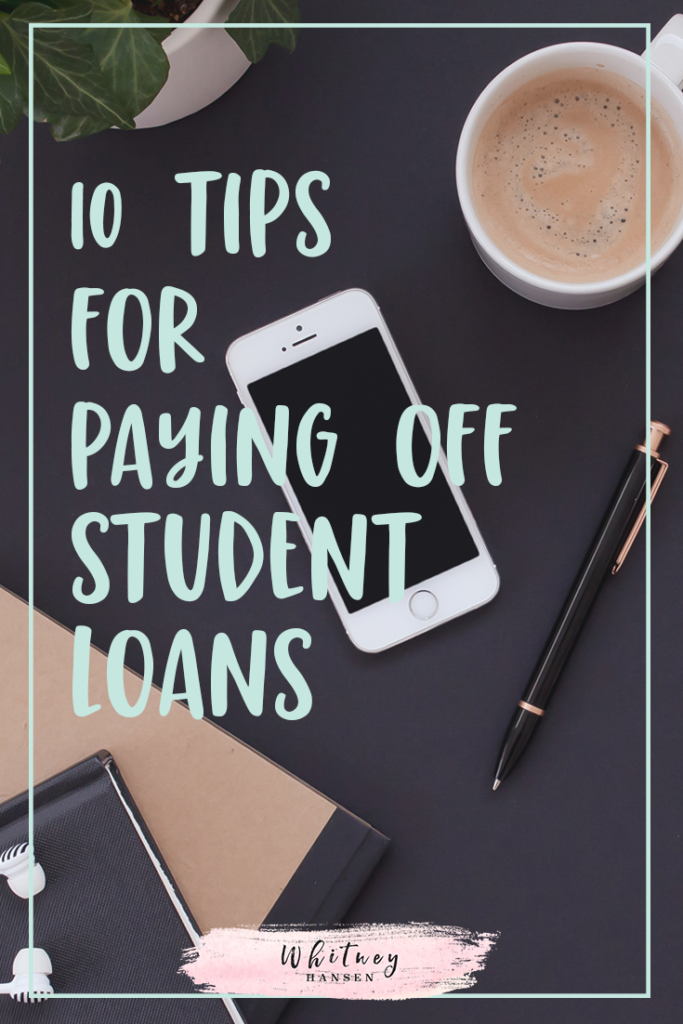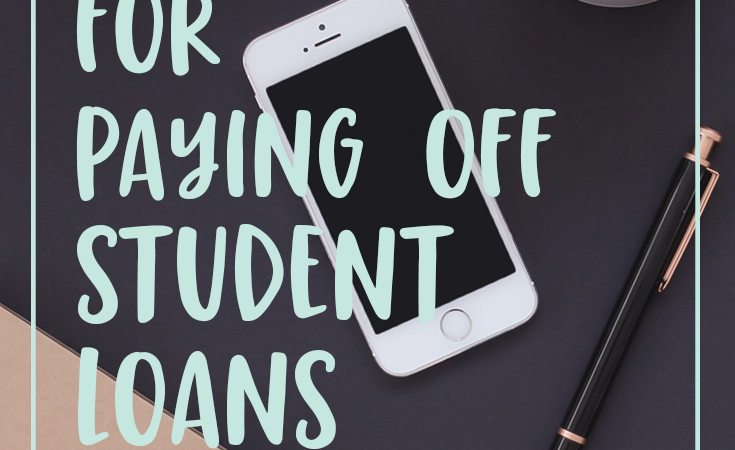Students loans are the skid marks on the underpants of society.
I have my own fair share of experience with students loans.
In 2010 I graduated with my bachelors in Accounting and racked up $30,000 in student debt. Not cool.
I remember checking the mail and walking into the house where I opened an envelope with my congratulatory you’ve got 6 months before you need to send us a check bill from the Federal government.
That’s when I had my come-to-Jesus moment of all those years of mindlessly borrowing and justifying why student debt was good debt came to a screeching halt.
It was time to roll up my sleeves and get to work.
With the tips in this article and a few additions to help you with your own plan, I was able to pay off the ENTIRE $30,000 in 10 MONTHS.
No, I wasn’t rolling in the dough. You can read my entire debt free story here.
Here’s a bit of context to the bigger problem.
The average student loan debt in 2016 was $37,172 (roughly $351 per month). People are saving less and less for retirement and when I see an average student loan payment of $351 per month, I immediately see part of the reason why people are struggling with investing.
From a macro perspective, this stuff gets worse. As a whole, we’re looking at $1.4 trillion in student debt. WTF?! About 2/3 of our nation’s GDP (gross domestic product) are reliant on consumer spending and new house purchases. When people have less disposable income to spend, this directly hurts the economy.
It’s a huge mess. But it doesn’t have to be your huge mess. You have options and you do not have to keep student loans around.

Tip 1: Don’t let student debt climb in bed with you
Most people let student loans become such a part of their life that it become just another bill to pay. The sooner you get pissed off about your student loans, the more drastic you’ll become with your plan, and ultimately, the faster you will get results.
A lot of people think that student debt isn’t a big deal because the interest rate is so low. It’s not necessarily about the interest rate being low, it’s about the opportunity cost of what you could do with that monthly payment instead.
Tip 2: Put your tax return directly towards your student loans
This is a great tip that came from Chad Methner in my money community. Chad’s spot on. Any extra money you receive should go directly towards the debt- especially your tax refunds. The average tax refund in the US was $2,763 in 2017, which equates to a nice chunk of change working towards paying off your debt.
Tip 3: Know your numbers
You’ve got to know what you’re dealing with. Write down the exact list of how much you owe for each student loan, what the interest rate is per loan, and the minimum payment.
Another money community member, Joe Koss, encourages us to “calculate the number of months and the amount needed per month to get the budget set as a minimum. Build in rewards throughout to keep yourself motivated for the process.”
I couldn’t agree more with Joe. Knowing your numbers and building in rewards are the key to getting results.
Tip 4: Use that 6 month “grace period” to your advantage
For most people, that grace period where you don’t have to make a payment for 6 months is a really big deal. This essentially gives you a “get out of jail free” car for a short period of time. Subsidized loans haven’t officially started accruing interest yet, meaning a bigger portion of your payments will go towards the balance you borrowed and not towards the interest.
Most people use that 6 months time of no payments to help them live life or further defer the debt off process, but if you are wise, and I know you are, you’ll start making payments the minute your graduate even though it’s not required. This helps your money go so much further.
Tip 5: Go all in on your debt payoff plan
You already have a debt free date! As stands, it will happen. So let’s try to get you there a bit more quickly. It’s important to know what type of personality you have. Are you one of those people who can stay focused for a long period of time, or are you one of the people who gets side tracked and loses motivation fairly quickly.
I personally, lose my motivation quickly. When I was looking at my debt payoff plan, I knew I couldn’t extend this past a year or I would lose motivation. I also know that I wanted that debt gone ASAP! So I was willing to work two jobs, not eat out once, and forgo the extra “goodies” at the grocery store to reduce my bills. In exchange this let me pay off debt in less than one year.
Tip 6: Stop saving you deserve to treat yourself
What you really deserve is a better financial life. There is a season for treating yourself and a season for cleaning up the debt messes. If you take step 5 seriously, you may only be in a season of cleaning up for a short period of time.
Don’t get me wrong- treating yourself isn’t a bad thing, but when you are trying to get rid of student loans quickly, it’s important to find cheap or inexpensive ways of treating yourself that don’t sabotage your plan. For example, if your version of treating yourself entails buying coffee and going for a walk, you might instead bring a thermos full of coffee from home and and take the walk. You’re receiving the same psychological benefit, without spending money that could have went to your debt.
Tip 7: Put spending barriers in place
I’ll never forget the time I was working during tax season, exhausted, didn’t have a day off in 3 months and convinced myself I work hard, so damnit, I deserve a $3 Americano. When I got into my car, I opened my wallet and saw my budget taped to my debit card. That was enough of a reminder that I created a plan to pay off debt and coffee didn’t fit into that plan. Taping my budget to my debit card was a way for me stay focused on my goal and put a barrier in the way from me spending.
- I had to remove my budget every time I wanted to swipe my card. (Which was a pain)
- Every time I pulled my card out, I had to look at my budget and be reminded of my goal.
Do whatever you need to do to stop yourself from spending on stuff outside of your debt payoff plan. Some people like to use gift-cards to help them stay accountable, others like the cash envelope system. Just find a way that works best for you.
Tip 8: Sign up for auto payment + go paperless
Stephanie Ellis, another money community member, mentioned that we should “find out if they offer any incentives for lowering your interest rate. I got my interest rate lowered for setting up monthly auto payments and paperless statements.”
The federal government loans will offer a .25% discount for signing up for auto payments and going paperless. This isn’t a ton of savings, but every little bit helps.
Tip 9: Get a part-time job or pick up overtime hours
This is the least sexy thing to say, I know, but it freakin’ matters. When you are trying to pay off debt quickly, you’ve got to do two things:
- Reduce expenses
- Increase income
When you begin to increase your income through part-time work, you’ll find results much faster. I’m a big fan of flipping items of eBay, driving for Uber (if your car is too old, like mine, try Uber Eats), working as a server, doing contract work, delivering pizzas, housesitting or nannying. Whatever you need to do to earn extra money.
If your job allows you to pick up overtime hours, do that! But keep that focus on earning extra money and putting every single dime of that extra money towards your student loans.
Tip 10: Keep living like a college student
If you are just now graduating from college and unsure of what to do next. Some of the best advice I can give to you is to keep your lifestyle the same. Don’t get the fancy apartment yet. Maybe stick around your parent’s basement a bit longer. Don’t buy that new car. Don’t take a vacation to reward yourself for graduating college. Keep your lifestyle minimal.
Then when you get your first “big kid” job out of college, put all of that money towards your student loans.
With these tips, you should be on your way to paying off student loans in no time. Stay focused and keep working towards your goals. In time, you will get great results.
Whitney

I was really lucky that I didn’t have any student loans after graduation. It’s because of this that I could save my earnings and reinvest it into my business.
That’s so awesome! I’m glad you were able to reinvest into your business!